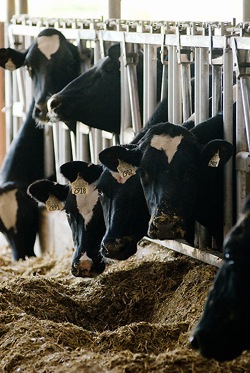Helping China produce more milk will boost U.S. dairy exports to China, experts say
As China expands its domestic milk production, it will buy more milk products from the United States.
That may seem counterintuitive, but it’s really just a case of the Chinese dairy industry generating more demand than it will be able to supply, according to an analysis by UW–Madison agricultural economists.

UW-Madison dairy experts say expanded Chinese milk production could boost demand for U.S. dairy exports.
Photo: Jeff Miller
“The potential market is so huge that whatever inroads they make for themselves in terms of dairy production will expand the market for others,” says Ed Jesse, who co-authored the study of China’s dairy sector. “You’ll get more people that garner a taste for dairy products and for types of dairy products that they don’t’ have now.”
A bigger Chinese dairy sector will also benefit U.S. firms that export dairy equipment and services and dairy cattle, semen and embryos – many of which are based in Wisconsin – notes Karen Nielsen, director of the UW–Madison’s Babcock Institute for International Dairy Research and Development.
Nielsen and others will be in China this month to work out details on a new partnership with the Shanghai Dairy Group, a conglomerate involved in milk production, processing, marketing and research. UW dairy experts and Chinese counterparts will establish a center to provide training and consulting for workers on the Shanghai Group’s farms.
On Tuesday, June 12, UW-Madison Interim Chancellor David Ward and Kathryn VandenBosch, dean of the College of Agricultural and Life Sciences, will meet with Shen Weiping, president of the Shanghai Dairy Group, to sign a letter of intent regarding the project. Ben Brancel, Wisconsin secretary of the Department of Agriculture, Trade and Consumer Protection, will be at the same event to sign a letter of intent with the Shanghai group regarding future trade opportunities.
This is familiar ground for the Babcock program, which has been collaborating with Chinese dairy scientists since the 1990s. In 2004 the Babcock Institute partnered with China Agriculture University in Beijing to set up the Sino-U.S. Dairy Research and Development Center, which holds seminars for dairy industry leaders from throughout China.
China’s appetite for dairy products is growing quickly, according to the analysis prepared by Ed Jesse and colleagues Bill Dobson and Fengxia Dong for the Babock Institute. Dairy foods aren’t part of the traditional diet, but consumption has risen as incomes have gone up and more families have acquired refrigerators. The economists expect per capita consumption of dairy products in China to grow 3.4 percent to 5.7 percent annually.
U.S. dairy exports reflect this. The value of U.S. dairy product sales to China increased more than eleven-fold from 2000 to 2010, according to the report. In 2010, China replaced Japan as the third-largest market for U.S. dairy exports.
China is pulling out all of the stops to grow its own milk production and processing industry. A five-year plan calls for boosting domestic production by two thirds over 2010 levels. But the UW analysts believe this goal is unattainable. China hasn’t had much luck increasing the productivity of its cows, has problems managing its large, feedlot-style dairies, and pays a high cost to import feed.
“I don’t think they’ll ever be able to produce enough to meet that demand,” says Jesse.
And that’s why helping China boost domestic production will help boost exports of U.S. dairy goods, he adds.
“Everything we do to expand local milk production and outsourced milk production in China benefits the total market in China for dairy products,” he says.
The analysis of China’s dairy sector and other global dairy trade reports are available online here.



